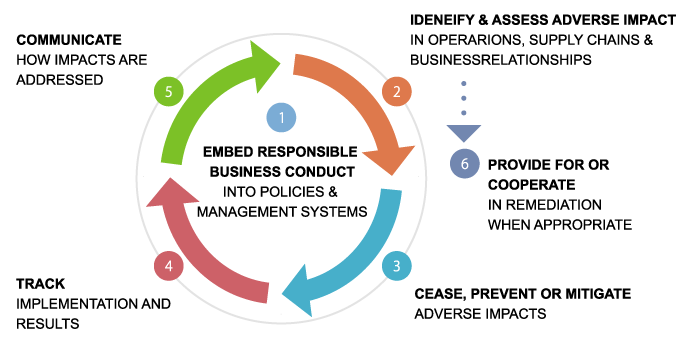- HOME
- Environment(E)
- Environmental Due Diligence
Environmental Due Diligence
Toward the “Realization of a Sustainable and Environmentally Friendly Society,” as outlined in the Environmental Policy, the Taisei Group has established and continuously implements a framework for Environmental Due Diligence to cease, prevent, or mitigate adverse impacts on the environment caused by the Group’s business activities, following international guidelines, etc. In operating this framework, we review and improve the framework accordingly and make efforts to deepen our initiatives to realize a sustainable and environmentally friendly society.

Embed Environmental Due Diligence into policies and the management system
In March 2023, the Taisei Group revised the Environmental Policy, which sets forth its commitment to implement Environmental Due Diligence toward the “Realization of a Sustainable and Environmentally Friendly Society.” The Group discloses this policy on the official Taisei Group website, etc., and with regard to the adverse impacts of the Group’s business activities on the environment (“environmental risks”), it will promote engagement with suppliers and communication with its stakeholders and make efforts to prevent and mitigate environmental risks.
Identify and assess adverse impacts on the environment
To identify and assess the adverse impacts on the environment caused by the businesses of the Taisei Group, the Sustainability Division (Integrated) and the Sustainable Procurement Council, under the guidance and recommendations of an outside expert (Mizuho Research & Technologies, Ltd.), referred to various guidance from Japan and abroad including CDSB (Climate Disclosure Standards Board) guidance, TCFD and TNFD and identified the risks related to all of the businesses of the Taisei Group for each value chain. The identified environmental risks (contamination and degradation of the atmosphere, the eco-system, water quality, and soil; the progression of climate change including global warming; health hazards, etc.) were subjected to quantitative analysis and assessment from the two aspects of “the degree of impact,” should such risks materialize, and “the probability of occurrence.” Following discussions at the Sustainability Committee and the Board, these risks were identified as “the risks that must be dealt with on a priority basis.” (hereinafter referred to as “identified priority environmental risk.”).
| Where risk occurs in the value chain | Impact factors | Risks |
|---|---|---|
| Upstream (business partners) | Changes in the use of land/seas | Contamination and degradation of the eco-system, water quality, and soil |
| Overexploitation of natural resources | Same as above | |
| Contamination and degradation by toxic substances (waste) | Contamination and degradation of the atmosphere, water quality, soil, and eco-systems | |
| Increase in greenhouse gas (GHG) emissions | Progression of climate change including global warming | |
| Direct operations (businesses of the Taisei Group) | Changes in the use of land/seas | Contamination and degradation of the eco-system, water quality, and soil |
| Contamination by toxic substances (waste) | Contamination and degradation of the atmosphere, water quality, soil, and eco-systems, and health hazards | |
| Increase in greenhouse gas (GHG) emissions | Progression of climate change including global warming | |
| Downstream (customers) | Increase in greenhouse gas (GHG) emissions | Progression of climate change including global warming |
Cease, prevent, or mitigate adverse environmental impacts
With regard to the “identified priority environmental risks.” related to the business of Taisei that must be dealt with on a priority basis, the headquarters in charge plays the principal role in taking various measures to achieve prevention and mitigation, including compliance with environment-related laws and regulations and initiatives of the TAISEI Sustainable Action® (TSA) to reduce environmental impact at worksites.
Furthermore, with regard to the identified priority environmental risks related to the supply chain, we are implementing measures to achieve prevention and mitigation such as the promotion of green procurement and collaboration with suppliers based on the Sustainable Procurement Guidelines, etc., and for the identified priority environmental risks related to customers, through proposals of environmentally-friendly construction materials and design.
Track implementation and results
The effectiveness of activities to address the “identified priority environmental risks.” related to the business of Taisei that must be dealt with on a priority basis is assessed through, among others, various patrols of worksites, monitoring by various committees, and checks and improvements based on company-wide risk management.
For activities to address the identified priority environmental risks related to the supply chain that must be dealt with on a priority basis, annual self-assessments by suppliers are conducted, and based on the results thereof, suppliers are visited and audited and an exchange of views is conducted for improvement.
The effectiveness of activities to address the identified priority environmental risks is also assessed by confirming the status of compliance with environment-related laws and regulations through the operation of the environmental management system (EMS) based on ISO 14001 and the degree of achievement of environmental targets.
Disclose information
The status of implementation of Environmental Due Diligence activities is regularly reported to the Sustainability Promotion Committee, the Management Committee, the Sustainability Committee, and the Board. These reports are disclosed in a timely and appropriate manner on the official website and in annual reports.
Provide for or cooperate in remediation when appropriate
Consultation contacts and whistle-blower contacts for violations of environmental laws and regulations have been established for consultations from all stakeholders within and outside the company. In the event that the Taisei Group has been determined to be the cause of, or a contributing factor to, an adverse impact on the environment, Taisei takes prompt action using appropriate means to provide remediation and implement corrective action in accordance with the Environmental Policy.
